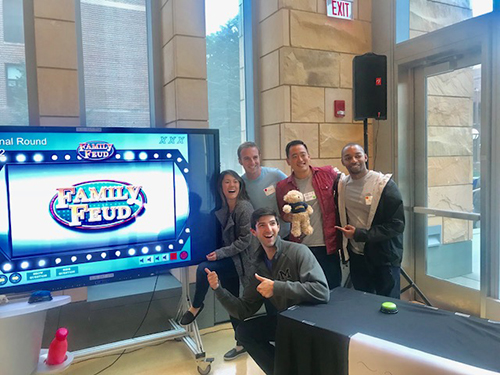Michigan Ross MBA Students Bring Awareness to Mental Health Through New Programs

Michigan Ross MBA students know mental health matters. It’s why a number of student-initiated programs that promote mental health can be found on campus this year.
Varied in format, the initiatives all recognize mental health and wellness can be one of the most challenging things for graduate students to balance.
These new programs include:
Peer Support Network
Created by Dayna Hine, MBA ‘19, and Britta Volz, MBA '18, the Peer Support Network creates time and space for MBA students to talk candidly about the challenges of being in a top MBA program. The network pairs together first- and second-year MBA students who share common interests to discuss everything from community to academics to recruiting. It’s an opportunity for open dialogue. Pairs can set their own meeting cadence, though most get together at least once a month.
“The second-year MBAs help normalize the experience for newer students and serve as a trusted resource to talk not only about challenges, but also to help collaborate on how to maintain balance throughout the program,” Hine notes.
Already, approximately 140 MBA students (70 pairs) are participating in the Peer Support Network.
Ross Recess

Ross Recess is an event series hosted by MBA Council and the Michigan Business Student Association that provides opportunities for the Ross community to come together and socialize outside of the MBA curriculum. Monthly events are open to all students, partners, faculty, and staff. Ross Recess drew approximately 50 people to its inaugural event this fall, at which teams competed against each other in a friendly game styled after Family Feud.
MBA Council Student Body President Kashay Sanders, MBA ‘19 says, “This event series aims to shake things up and create a path for people to chat up that person who sits in front of them in Econ, or finally meet their section mate’s partner, or see a faculty member in a more casual setting. We believe the more connected people feel to their classmates, faculty, and administration, the more Ross feels like home.”
MBA Council and MBSA hope Ross Recess can be another way for those in the Ross community to get to know each other outside of traditional social events. They plan to partner with different student groups each month to host events.
The Comfort Zone: Case Competition Winner
The focus on mental health is even extending into business plans and case competitions for students at Michigan Ross. The winners of the Entrepreneurship and Venture Capital Case Competition in October was a team of Michigan Ross MBAs who developed The Comfort Zone — an organization that seeks to help students achieve a healthy and balanced graduate student experience.
The Comfort Zone does so by 1) raising the awareness and utilization of existing health and wellness resources on campus and 2) connecting a diverse community of students who value well-being.
It’s a platform that makes it easier for the graduate student community to access the resources and people that support mental health on campus.
Alexis Morath, MBA ‘19; Tracy Wolfbiss, MBA ‘19; and Emily Lucas, MBA ‘19 are the originators of the proposal.
“After our first year at Ross, each of us independently felt a need to better balance the demands of school and life. New survey findings in the journal Nature Biotechnology reveal that graduate students are more than six times as likely to suffer from depression and anxiety compared to the general population, and this rate is even higher in women,” Morath says.
The Comfort Zone held a soft-launch during this year’s Women in Leadership Conference. Their interactive board asked students to share how they stay balanced at Ross, at work, and in life.
The group is working to officially roll out the platform on campus later this fall. Students can reach out to thecomfortzoneuofm@gmail.com with questions.
Women in Leadership Conference: Mental Health Panel
This year’s Women in Leadership Conference also gave spotlight to health and wellness initiatives. The panel “Treat Yourself: How to Incorporate Wellness into a Busy Life”, led by Ross Counseling and Psychological Services (CAPS) representative Julie Kaplan, focused on ways women can sustain and increase their mental health and overall well-being.
Encouraging women to put themselves first was a shared theme of these strategies. For example, the panel underscored the impact of forming positive habits and identifying the non-negotiable, self-care activities to stick to on a regular basis.
Devoting one day a week to explore interests outside of Ross and work is one way to make sure those interests aren’t lost in the shuffle. It also hit on JOMO: the joy of missing out. A willingness to say no more often opens up opportunities to say yes to more fulfilling endeavors.







